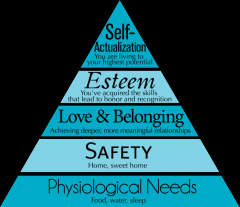![]()
![]()
![]()
Use LEFT and RIGHT arrow keys to navigate between flashcards;
Use UP and DOWN arrow keys to flip the card;
H to show hint;
A reads text to speech;
42 Cards in this Set
- Front
- Back
|
personality |
characteristic pattern of thinking, feeling, acting if you are really outgoing, and consistently so, people may say you have a "strong" personality |
|
|
free association |
method of exploring unconcious sit and talk about anything that comes to mind |
|
|
psychoanalysis |
techniques used to treat psychological disorders by seeking to expose the tensions Freud's theory of personality |
|
|
unconscious |
reservoir of mainly unacceptable thoughts, feelings...etc Freud's theory of personality |
|
|
id |
strives to satisfy basic sexual and aggressive drives operates on the pleasure principle |
|
|
ego |
largely conscious part of personality that mediates among the demands of the id and superego according to Freud |
|
|
superego |
represents internalized ideals and provides standards for judgement according to freud |
|
|
psychosexual stages |
Oral, Anal, Phallic, Latency, and Genital the id focuses on certain areas of the body |
|
|
Oedipus Complex |
a boy's sexual desires toward his mother and feelings of jealousy and hatred for the "rival" father Oedipus Rex |
|
|
identification |
process by which children incorporate their parent's values into their superegos according to Freud |
|
|
fixation |
focus of pleasure-seeking energies in psychosexual stages determines where conflicts were unresolved |
|
|
defense mechanisms |
ego's protective methods to reduce stress/anxiety unconsciously distorts reality |
|
|
repression |
basic defense that banishes anxiety represses thoughts or feelings that provoke |
|
|
regression |
defense mechanism that makes a person retreat to a more infantile stage adult may cuddle with "blankey" for comfort |
|
|
reaction formation |
defense mechanism where ego switches unacceptable impulses into their opposites people may express feelings that are opposite to the ones that cause them stress/anxiety |
|
|
projection |
defense mechanism where people disguise their own impulses by attributing them to someone else blaming someone or directing attention away |
|
|
rationalizing |
defense mechanism that offers self-justifying explanations takes place of the real, more threatening reasons for an action |
|
|
displacement |
defense mechanism that shifts sexual or aggressive impulses to a more acceptable outlet playing sports for relief of anger |
|
|
projective test |
personality test that provides stimuli designed to trigger inner dynamics personality test like the rorschach |
|
|
Thematic Apperception Test |
person is shown an ambiguous scene and is asked to make up a story about it called the "TAT", colors and other indicators are removed from scene |
|
|
Rorschach test |
inkblots to analyze inner feelings person analyzes blots and explains what he/she sees |
|
|
collective unconscious |
concept of shared, inherited reservoir of memory traces from our species' history (Carl Jung) |
|
|
self-actualization |

ultimate psychological need that is at the very top of Maslov's pyramid |
|
|
unconditional positive regard |
attitude of total acceptance toward another person according to Rogers |
|
|
self-concept |
thoughts and feelings about ourselves "Who am I?" |
|
|
trait |
characteristic pattern of behavior or disposition to feel and act assessed by self-report inventories and peer reports |
|
|
personality inventory |
used to gauge feelings/behaviors also used to assess selected personality traits |
|
|
Minnesota Multiphasic Personality Inventory |
MMPI identifies emotional disorders |
|
|
empirically derived test |
developed by testing a pool of items and then selecting that discriminate between groups ex; MMPI |
|
|
social-cognitive perspective |
views behavior as influenced by the interaction between persons and their thinking/social context |
|
|
reciprocal determinism |
interacting influences between personality and environment |
|
|
personal control |
our sense of controlling environment either have control or feel helpless |
|
|
external locus of control |
perception that chance or outside forces determine one's fate beyond personal control |
|
|
internal locus of control |
perception that one controls their own fate "I got this." "I am in control." |
|
|
learned helplessness |
hopelessness and passive resignation when you think you can't avoid something relates to sense of control |
|
|
spotlight effect |
overestimating others' noticing you i wear the same clothes a lot and i feel like people will notice but they really don't care |
|
|
self-esteem |
one's feelings or high or low self-worth mine fluctuates, but it is good to have high self-esteem |
|
|
self-serving bias |
readiness to perceive oneself favorably meh |
|
|
individualism |
giving priority to one's goals over group goals trump |
|
|
collectivism |
giving priority to goals of group sanders |
|
|
terror-management theory |
proposes that faith in one's worldview with provide protection against fear of death is like worth living? idk |
|
|
positive psychology |
study of optimal human functioning |

